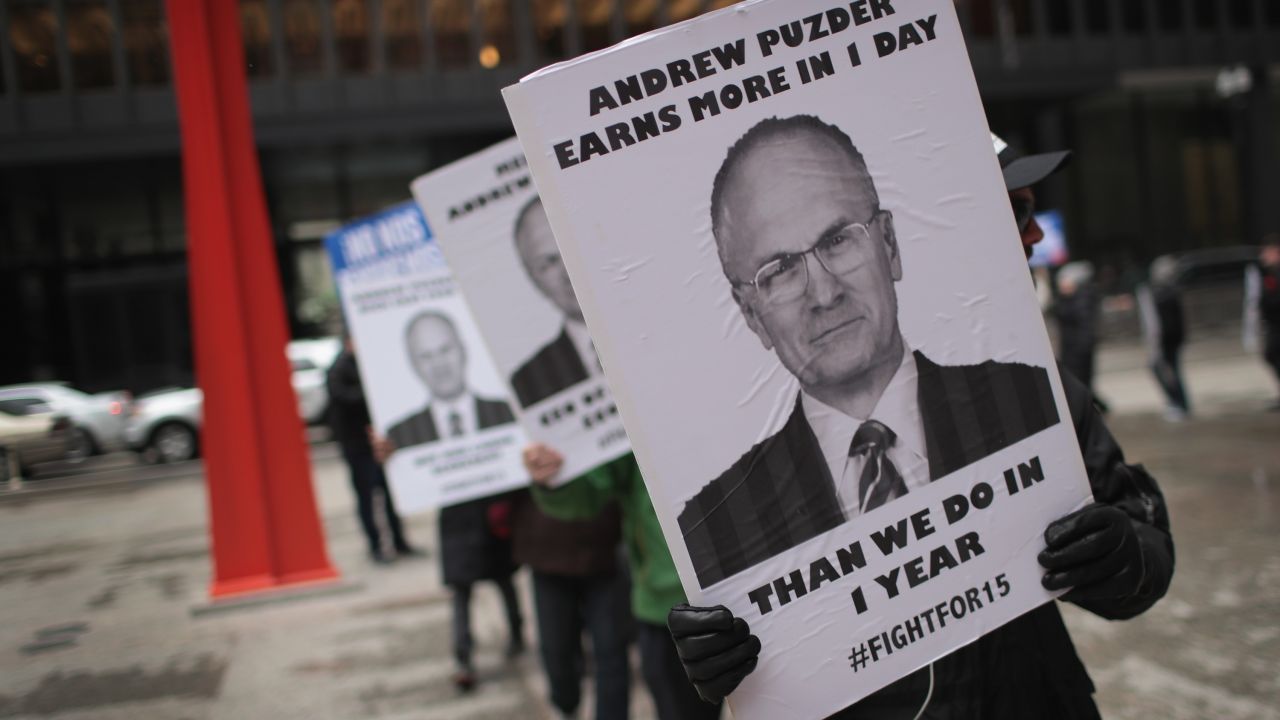
Fight for $15 workers protest the nomination of Andrew Puzder for labor secretary on Jan. 26, 2017 in Chicago. The protest was one of more than 30 held nationwide. (Photo by Scott Olson/Getty Images)
President Trump would like you to believe journalists sit around twiddling their thumbs on Twitter and regurgitating “fake news” from real leaks (whatever that means), but in reality teams of reporters are investigating, working their sources, vetting information with former and current government officials, and searching for the truth about whether a foreign power influenced our elections. Unless you were on a media detox retreat this week, you know The Washington Post on Monday revealed that acting Attorney General Sally Yates warned the White House that national security adviser Michael Flynn possibly undercut US sanctions in an inappropriate conversation with the Russian ambassador in December and lied about it to Vice President Pence. Flynn resigned later that day. By midweek The New York Times published an explosive story about pre-election contact between Trump campaign advisers and Russian intelligence operatives. The calls for further government investigation have begun. We are more secure, not less, when persistent reporting delivers and the truth comes out.
Labor Nominee Puzder Withdraws
— Politico
Donald Trump’s choice to be labor secretary, fast-food CEO Andrew Puzder, began his nosedive with his own admission of hiring an undocumented housekeeper, then hit the dirt this week after Politico posted a 27-year-old Oprah episode in which his ex-wife accused him of domestic abuse. Following his nomination in December, Marianne LeVine, a labor reporter for Politico Pro, wrote 57 stories about Puzder. LeVine dug through legal documents and old newspaper clips, talked to Puzder’s friends and neighbors, worked her contacts on the Hill and ultimately found the damning videotape that exposed a past that Puzder preferred to keep hidden. The facts were not served up “on a silver platter by opposition researchers or Washington whisperers with clear partisan agendas,” Politico editor Carrie Budoff Brown wrote in a memo to staffers. By Wednesday, Puzder withdrew before his confirmation hearing began. (Feb. 15, 2017)
Federal Judge Says Remington Settlement Over Deadly Rifle Defect May Be Too Lenient
— The Trace
A groundbreaking 2010 investigative report — “Remington Under Fire” — by Scott Cohn of CNBC continues to hold powerful companies like Remington Arms accountable, even when our government does not. Adam Weinstein, writing in The Trace, provides a comprehensive overview of the shocking case of negligence, and the galling reason it has taken so long for victims of this deadly and negligent glitch to see justice. In 2010, the CNBC investigation brought to light a dangerous defect in a popular hunting rifle. This week, a federal judge in Kansas City said he would rule in the next 30 days on whether the class-action settlement against Remington is severe enough. Critics are convinced it is not, and the judge is also skeptical. Remington may get away with paying less than $3 million despite knowingly installing faulty trigger mechanisms for 40 years, leading to dozens of accidental deaths, more than 100 injuries and thousands of customer complaints. Weinstein also revisits Catherine Dunn’s 2015 International Business Times investigation — “Bullets Beyond Recall” — which found that, thanks to pro-gun members of Congress, gun manufacturers are exempt from many US consumer safety reviews and regulations. (Feb. 15, 2017)
Police to Strengthen Force in New York’s Most Violent Borough and Murder in the 4-0
— The New York Times
Last week, New York Times investigative reporters won a victory for residents of the South Bronx when the NYPD announced plans to send 75 new officers to address the shortage of detectives in the city’s most violent borough. The Times reporting began as an immersive project, titled “Murder in the 4-0.” Four reporters pounded the pavement to chronicle the lives and deaths of every person murdered in 40th Precinct of the South Bronx in 2016. Their reporting culminated on Dec. 31, 2016, with an impressive and wrenching analysis by Benjamin Mueller and Al Baker titled “The Rift Between Officers and Residents as Killings Persist in the South Bronx.” “In housing-project lobbies and three-generation family apartments, outside methadone clinics and art studios, people take note of the inequity,” they wrote. “They hear police commanders explain that they lack the resources to place a floodlight on a dangerous block or to post officers at a bullet-ridden corner. They watch witnesses cower behind triple-locked doors, more fearful of a gunman’s crew than confident in the Police Department’s ability to protect them. So though people see a lot, they rarely testify.” In the South Bronx, as in many black and Hispanic underserved neighborhoods throughout the United States, the relationship between the police and the people they are supposed to protect is “in tatters.” (Feb. 8, 2017)
You’ll be well-rewarded for taking the time to follow the results of months of deep digging. You can also hear from reporters Mueller and Baker themselves as they describe their work on ProPublica’s Breakthrough Podcast. (Feb. 10, 2017)
Big Oil’s Grip on California
— Center For Public Integrity
This engrossing investigation by Michael Mishak of the Center for Public Integrity has not gotten results yet, but we will be watching. California usually leads on environmental issues, passing some of the toughest energy regulations in the country and setting aggressive goals to cut greenhouse-gas emissions. But don’t be blinded by appearances. “California is the third-biggest oil-producing state, behind only Texas and North Dakota,” writes Mishak. Over the past six years, “Big Oil has spent more than $122 million on campaign contributions and lobbying to boost production, weaken regulatory agencies and mold energy policy.” Even though Gov. Jerry Brown says he wants the state to lead on efforts to combat climate change, invest in renewable energy and manage water wisely, Big Oil wins way more than you would think. Mishak carefully peels back California’s sunny veneer to show you exactly how the oil lobby undermines state and federal laws and hobbles the EPA. The industry might beef up their ample profits, but in its wake people lose jobs, lose their farms, lose clean water supplies and even lose their lives. (Feb. 13, 2017)




